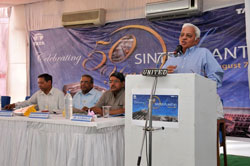Sinter Plant#1 completes 50 years of its journey at Tata Steel
 Tata Steel today celebrated the Golden Jubilee of Sinter Plant 1 at its premises in the Jamshedpur Works. The function was graced by Mr B Muthuraman, Managing Director, Tata Steel, as the chief guest and Mr Raghunath Pandey, President, Tata Workers’ Union, as the guest of honour. Mr H M Nerurkar, Executive Director, India and South East Asia, was also present on the occasion. With this, Sinter Plant 1 completes 50 years, replete with rich experience, under the tutelage of those who are role-models in the steel industry today.
Tata Steel today celebrated the Golden Jubilee of Sinter Plant 1 at its premises in the Jamshedpur Works. The function was graced by Mr B Muthuraman, Managing Director, Tata Steel, as the chief guest and Mr Raghunath Pandey, President, Tata Workers’ Union, as the guest of honour. Mr H M Nerurkar, Executive Director, India and South East Asia, was also present on the occasion. With this, Sinter Plant 1 completes 50 years, replete with rich experience, under the tutelage of those who are role-models in the steel industry today.
Present on the occasion were several renowned sinter-makers who have paved the way for the global stature that Tata Steel enjoys today; Dr T Mukherjee, Mr M S Dighe, Mr R V Chari, Mr. Amitabha Mukherjee, Mr V Balasubramanium, Mr P N Roy, Mr R P Tyagi, Mr. K K Mangal, Mr B K Das, to name a few. Sinter Plant-1 is the oldest sinter making plant in India. After growth of sintering technology in India, several steel plants like SAIL, RINL etc adopted this technology. Now Tata Steel has four Sinter Plants producing 7.8 MTPA of sinter and pioneering in sintering technology.
Addressing the gathering Mr Muthuraman said, “The Golden Jubilee celebration is a nostalgic, historic occasion. Over the last 50 years, SP1 has played a vital role in steel making, thereby helping our country to improve its economy in a rather environment-friendly way. The Steel Works at Jamshedpur is truly a role model to all our other units. I wish all my colleagues the very best in days to come.” Mr H M Nerurkar too lauded the effort of all saying, “We have had quite a few gainful years at sinter making. With our understanding of technical know-how towards sinter making and steel-making getting enriched on a constant basis, we are better placed today to use sinter efficiently at all our blast furnaces.” Mr Raghunath Pandey, spoke highly of the harmonious relations that Tata Steel management has shared with the Union for more than 75 years now.
One of the first technical headway in steel-making technology, the Sinter Plant was installed for the first time in India at Tata Steel Jamshedpur Works, to use fine iron ore amply available in Noamundi and Joda mines. As iron ore fine cannot be charged into the Blast Furnace directly to make hot metal, Sinter Plant helps in making lumps out of iron ore fines and dust with the help of solid fuel. Sinter Plant No.1 is the oldest sinter making plant in India and was commissioned by Ms Lurgi, Germany during two million ton program (TMP) of Tata Steel in Year 1958.
Over the years, it has helped to increase the iron ore reserves life in India by using fines and dust of the mines. It is now competing with new sinter plants globally, owing to its higher quality and lower cost of product, through constant improvement of its technology and facilities. Recently, the Company has spent a lot of money to improve its quality further, with the result that SP1 sinter is now being consumed by larger blast furnaces without any problem. To improve environment, Sinter Plant uses a lot of waste material generated in steel plant. Requirement of coal and coke becomes low when sinter is used for making hot metal. Thus Sinter Plant 1 is serving the country to improve its economy, conserve natural resources and environment significantly.
About Tata Steel
Established in 1907 as Asia's first integrated private sector steel company, Tata Steel Group (including Corus) is among one of the world’s top ten steel producers with an annual crude steel capacity of over 24.4 million tonnes. It is now the world's second-most geographically-diversified steel producer, with operations in 26 countries and a commercial presence in over 50 countries. The Tata Steel Group, with a turnover of US$ 29 billion in FY '09, has over 80,000 employees across five continents and is a Fortune 500 company. Tata Steel India is the first integrated steel plant in the world, outside Japan, to be awarded the Deming Application Prize 2008 for excellence in Total Quality Management.










